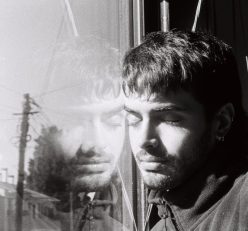A question often introduced in my mind, which appeals to be very existentialist, working alongside self-improvement to become a better person and following the premise of asking ourselves the right questions, has been chasing me since its acceptance in my philosophical values. My conclusion was devastating. I was not expecting that my empirical logic would be defining my current role in society till the point where I want to quit and stop doing what I have been supporting in the last three years. Perhaps this is my dramatic persona working flawlessly or obsessive behaviorism of mine, but the late motif in this dilemma is the art itself. I stopped interrogating “what art should I do?” and began to question “why should I do art?”. The answer: because I want to express MY feelings, MY ideas, MY knowledge on the living things. All this time I have been producing material to sustain my fears or my mental illnesses overall, my points towards various themes. All this time, I had to feed my ego as I way to exponentiate my self-pithiness. I have been admiring my suffering and my perspectives and painting in with sound and music.
In conclusion, art is, in fact, an egocentric expression, and for now, it seems impossible for me to refute this idea.

Lately, I found myself reading Bukowski’s Tales of Ordinary Madness, a book where he writes, in short stories, about his personal experiences where some of which are fictional versions of his reality. Apart from his cutting edge way of writing, which is very dirty, hostile, and drunk, all the tales depict a man decaying in his flaws, till the point you are impressed with the level of indecency that the poor guy has. Along with the reading, you come across descriptions like:
– LISTEN, GUSTAV, THE LAST POET WE WENT TO SEE WAS A TERRIBLE PERSON. WE HADN’T BEEN THERE MUCH MORE THAN A HOUR AND HE STARTED GOT DRUNK AND STARTED THROWING BOTTLES ACROSS THE ROOM AND CUSSING US. – THAT WAS BUKOWSKI. ONLY HE DOESN’T REMEMBER US. – NO WONDER. – BUT HE’S VERY LONELY. WE SHOULD GO SEE HIM.
in Great Poets Die in Steaming Pots of Shit
Artists live this fake reality where they think their products are made for others to appreciate, and perhaps cure or help or relate, where it is only made for the person who created it. Now every time I read interviews to musicians about their new content, they often say something not as literally as I am going to indicate, but very similar – this album was made for those who... The answer: No, it was not. It was made for you, and only you. The only problem is you can see your egocentrism. Jean Piaget, in his theory of “Stages of Cognitive Development”, would say that egocentrism is one of the characteristics of a child in the “Preoperational Stage” (2-7 years) because the subject in this zone cannot see a situation from another’s point of view, assuming that other people see, hear, and feel the same as the child does (Saul McLeod, 2018). I believe that artists lack the same things, which in this case is more complex to understand and to depict. Artists are blind to a deeper understanding.

The dark side of being creative and having art motion is that we all look at the mirror in the same way as Narcissus did, but this time we can’t tell that reflection, considering there is nothing wrong with it. On a larger scale, artists are closed into one reality – anthropocentric reality. Our creations are only available for our species, for those who speak and communicate the way we do. Historians focus on our doings in the past, but only for our species. Phylosophers interrogate themselves about problems we, the homo sapiens, have. Even scientists are a bit focused on what we are formed on, even if they are geocentric. The study only what inside this strange blue and green bubble called Earth. We are too closed and too enclosed. Maybe I should focus on the universe. Possibly the right questions are made among the stars and the things that don’t belong to our reality. I don’t to be an artist anymore. I want to avoid anything that resonates with the need to look to myself.
